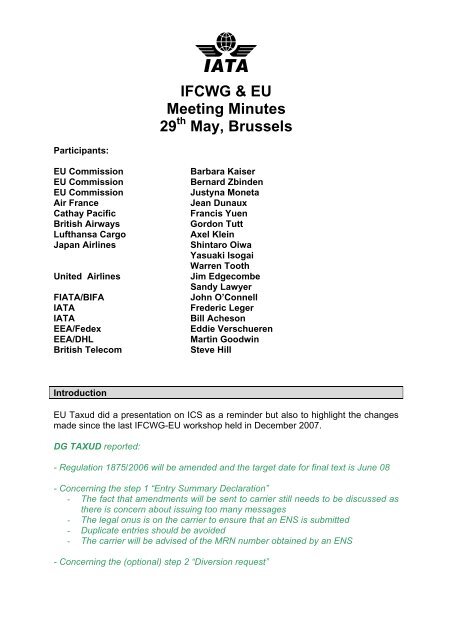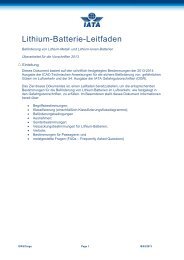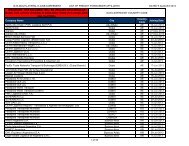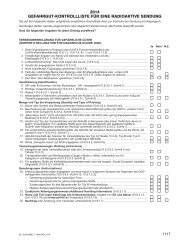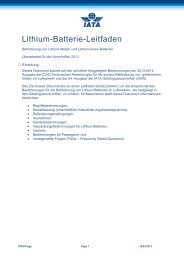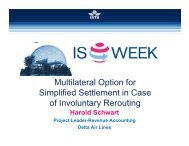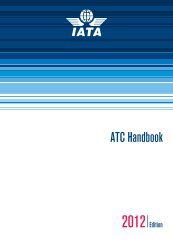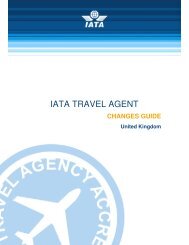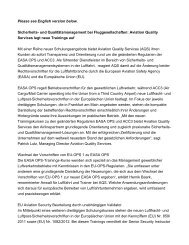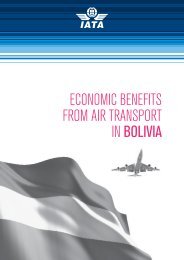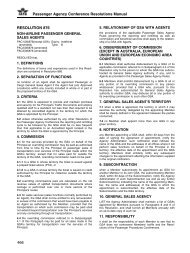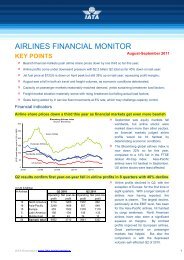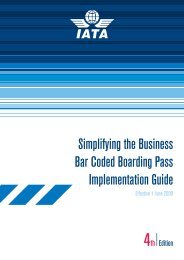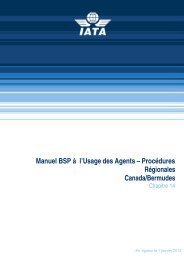ICS Implementation plans
ICS Implementation plans
ICS Implementation plans
Create successful ePaper yourself
Turn your PDF publications into a flip-book with our unique Google optimized e-Paper software.
Participants:<br />
IFCWG & EU<br />
Meeting Minutes<br />
29 th May, Brussels<br />
EU Commission Barbara Kaiser<br />
EU Commission Bernard Zbinden<br />
EU Commission Justyna Moneta<br />
Air France Jean Dunaux<br />
Cathay Pacific Francis Yuen<br />
British Airways Gordon Tutt<br />
Lufthansa Cargo Axel Klein<br />
Japan Airlines Shintaro Oiwa<br />
Yasuaki Isogai<br />
Warren Tooth<br />
United Airlines Jim Edgecombe<br />
Sandy Lawyer<br />
FIATA/BIFA John O’Connell<br />
IATA Frederic Leger<br />
IATA Bill Acheson<br />
EEA/Fedex Eddie Verschueren<br />
EEA/DHL Martin Goodwin<br />
British Telecom Steve Hill<br />
Introduction<br />
EU Taxud did a presentation on <strong>ICS</strong> as a reminder but also to highlight the changes<br />
made since the last IFCWG-EU workshop held in December 2007.<br />
DG TAXUD reported:<br />
- Regulation 1875/2006 will be amended and the target date for final text is June 08<br />
- Concerning the step 1 “Entry Summary Declaration”<br />
- The fact that amendments will be sent to carrier still needs to be discussed as<br />
there is concern about issuing too many messages<br />
- The legal onus is on the carrier to ensure that an ENS is submitted<br />
- Duplicate entries should be avoided<br />
- The carrier will be advised of the MRN number obtained by an ENS<br />
- Concerning the (optional) step 2 “Diversion request”
- A new article 183e in Regulation 1875/2006 will be inserted to specify that the<br />
unique key is sent to the declared office of first entry and Annex 30a will be<br />
updated with a new table<br />
- The unique key is defined as mode of transport/flight number/arrival date/office<br />
of first entry<br />
- Concerning the step 3 “Arrival notification”<br />
- A new article 184g will be added in Regulation 1875/2006<br />
- The arrival notification falls under national competency so specifications and<br />
format depend on Member States (MS)<br />
- This is a requirement for all goods on board including FROB (freight in the<br />
aircraft even if doesn’t enter the EU)<br />
- The arrival notification is sent by the operator of the aircraft to the actual first<br />
office of entry only so it is not provided to subsequent office of entries<br />
- If a risk is identified then subsequent offices would be advised of the risk<br />
- A part from national data requirements the “entry key” or the MRNs for the<br />
related ENS are required<br />
- Concerning the step 4 “freight presentation”<br />
- Presentation of goods is a national matters except for the information<br />
exchanged between customs (IE302 and 303)<br />
- Process C03 can be used by national administrations but doesn’t reflect the<br />
scope (this is for information purposes for now)<br />
- General comments<br />
- As far as the ENS and the diversion request are concerned, the structure,<br />
content, codes and validation are binding but the technical format XML,<br />
EDIFACT… are defined by member states (mainly XML)<br />
- Legal provisions for EORI were adopted on 25 April 2008<br />
- Member States were surveyed and the results can be viewed on the EC web<br />
site<br />
- Any party anywhere can obtain an EORI number; the COM will publish a list of<br />
authorities assigning EORI numbers on its website<br />
- Special circumstances indicator 'E' can be used by an AEO if he wants to<br />
provide for the reduced data set. The Person lodging the ENS and all<br />
consignees indicated in an ENS must qualify<br />
- European Customs Info Portal (ECIP)<br />
- The ECIP will be a web site information for the trade community on guidelines<br />
and advises to make successful customs transactions<br />
- Direct links to national customs web portal will be provided with the agreement<br />
of the member states<br />
- This web site will not be for customs declaration download or upload<br />
- The target deadline for implementation is Feb. 2011<br />
- A first introduction will be made to the Trade Contact Group on 11 July
1. Import Customs System<br />
(TAXUD 1043/2006 Version 6.2 & Reg. 1875/06 - Annex 30A)<br />
IFCWG asked for some clarifications on some open points that were not closed<br />
after the previous IFCWG & EU workshop in December 2007:<br />
Consignor and consignee – could it be the freight forwarder?<br />
DG TAXUD reported:<br />
- The consignee has to be the party to whom the goods are actually consigned but<br />
sometimes it is not possible to know the name of the final recipient so Annex 30 A<br />
may be updated<br />
- The consignee and consignor declared should be the original and final ones, e.g.<br />
seller and buyer<br />
- If the information re the consignee is too vague (e.g. unknown forwarders) then risk<br />
analysis my raise issues<br />
Conveyance Reference Number composition (Carrier code + flight number) and<br />
format should be confirmed (should not use AA1 but AA001)<br />
DG TAXUD reported:<br />
- The conveyance Reference Number composition is the Carrier code + flight number<br />
- It is trade responsibility to ensure compliance to this standard (IATA or other) format<br />
but agreed that the format could be re-discussed to reduce errors.<br />
Trade should not have to re-submit Entry Summary Declaration data to office of entry<br />
or subsequent offices of entries<br />
DG TAXUD reported:<br />
- Trade will not have to re-submit the ENS to sub-sequent offices of entries (since the<br />
current Art. 184e, last paragraph will be amended); (similar for the Arrival Notification)<br />
IFCWG asked for some clarifications on Cargo description (TAXUD 1402/2007):<br />
What are the acceptable cargo descriptions? Where can they be accessed?<br />
DG TAXUD reported:<br />
- The acceptable and non-acceptable commodity code descriptions are in the<br />
document TAXUD 1402/200 that is also available on the TAXUD website indicated in<br />
the presentation. This document will be regularly updated.<br />
- The 4 digit (HS commodity) code in Annex 30a is optional and can be used.<br />
IFCWG members mentioned that the Air transport Industry prefers an aggregation<br />
per HAWB and risk analysis could be performed on string (text) even if there are
multiple descriptions. IFCWG members reminded the complexity for forwarders and<br />
carriers to have description per lines.<br />
DG TAXUD reported:<br />
- That there is nothing in Annex 30A that prevents Trade of merging goods of<br />
different commodities in one single goods item, but then the commission could be<br />
pressured to consider moving to HS code. EU reminded the limitation of 356<br />
characters and indicated that the EC list had been based on the US list.<br />
IFCWG asked for some clarifications on the Entry Summary Declaration data:<br />
Loading and unloading points should be ISO country code + IATA airport codes<br />
DG TAXUD reported:<br />
- Loading and unloading points are free text but the country code ISO (2 digits) is<br />
mandatory (country codes of the customs offices are required).<br />
- IFCWG members will recommend their members to insert the Country code + the<br />
IATA Airport code<br />
IFCWG asked if the kind of package can be defaulted to only one kind for air and can<br />
the package information be limited to number of pieces or number of packages since<br />
air only has piece count.<br />
DG TAXUD reported:<br />
- DG Taxud reminded that 3 types of information; kind of packages (from UN<br />
recommendation) then number of pieces and then the shipping marks are requested.<br />
- IFCWG mentioned that the kind of package should not be mandatory but EU<br />
clarified that this cannot be changed.<br />
Re-use of MRN number for split shipments)?<br />
DG TAXUD reported:<br />
- Arrival notification and presentation of goods are up to the member states and this<br />
should now be dealt at national level.<br />
- IFCWG members mentioned that if this has to be investigated with each member<br />
states then the process will be “painful”?<br />
- DG Taxud proposed to bring forward this issue dedicated to Air transport and<br />
discuss it in a workshop or discuss it in a next <strong>ICS</strong> meeting.<br />
Inconsistency between rule 899 (characters 3 & 4) and structure of MRN (2 first digits<br />
are the year)
DG TAXUD reported:<br />
- DG Taxud agreed and will correct the rule 899 as the MRN structure prevails.<br />
IFCWG asked for some clarifications on the Arrival Notification:<br />
IFCWG asked again if the kind of package can be defaulted to only one kind for air<br />
and can the package information be limited to number of pieces or number of<br />
packages since air only has piece count.<br />
DG TAXUD reported:<br />
- The answers are similar to the one for the Entry Summary Declaration.<br />
IFCWG mentioned that the cargo manifest format should remain status quo if not<br />
electronic. If electronic then it should be the Arrival notification message.<br />
DG TAXUD reported:<br />
- The Arrival Notification specifications are up to the member states.<br />
IFCWG identified that both the MRN and unique conveyance id are mandatory in the<br />
specifications. Perhaps only one e.g. the unique conveyance id may be used?<br />
DG TAXUD reported:<br />
- The Arrival Notification is not in scope of <strong>ICS</strong> so far and should be considered as<br />
guidance by the member states. Specifications may be updated later on.<br />
IFCWG asked for some clarifications on the timelines of implementation:<br />
IFCWG mentioned raised some concerns on the 1 st of July 2009 timelines:<br />
- Many Member States specifications will not be provided on time<br />
- Too little time for trade and transport to be ready<br />
- 24 months are required after national technical specs are ready<br />
- An updated state of play for the <strong>ICS</strong> national <strong>plans</strong> is required<br />
- National implementations plan for ECS phase 2 / NCTS phase 4 are required.<br />
DG TAXUD reported:<br />
- The state of play is on CIRCA. When all information is available then it will be on the<br />
website (scheduled for end of June 08). It will include ECS phase 2 & NCTS phase 4.<br />
- The EU Commission will help the member states to meet the July 09 deadline.<br />
- The specifications for Entry Summary declaration are now quite stable and should<br />
be shared with IATA and FIATA members to start working on it.
- The information required by member states is already known but not the technical<br />
specifications.<br />
IFCWG was concerned that the EC seemed to underestimate the resources and<br />
workload that industry would have to bear to develop applications that can handle<br />
multiple formats<br />
IFCWG asked for some clarifications on the FROB (Freight remaining on<br />
board):<br />
IFCWG would like to determine when and how FROB needs to be reported?<br />
DG TAXUD reported:<br />
- The Entry Summary Declaration and Arrival Notification are required for all goods<br />
on board including FROB.<br />
- Some figures related to FROB need to be provided such as the potential number of<br />
Entry Summary declaration.<br />
- IFCWG members mentioned that it could be provided but at high level with some<br />
hypothesis.<br />
- EEA mentioned that some figures could be provided at high level (number of flight).<br />
IFCWG asked for some clarifications on control notifications:<br />
IFCWG would like to determine who is informed of potential customs intervention and<br />
controls (Carriers? Carriers AEO)?<br />
DG TAXUD reported:<br />
- Legally notifications are only sent to AEOs and MS can send this information in<br />
advance. This is true only if the person lodging the declaration is a safety and<br />
security AEO. If a third party has lodged the declaration then the carrier is not<br />
informed.<br />
- DG Taxud team managing the AEO is aware of this concern and is taking care of<br />
this. It may be amended later on in the context of the Modernized Customs Code..<br />
IFCWG asked if traders are informed of preventive measures at subsequent ports?<br />
DG TAXUD reported:<br />
Risks analyses are transmitted to subsequent ports but they can perform their own<br />
risk analysis or they can take their own decisions. The intention is that the AEO who<br />
lodges the declaration is informed about no load decisions and about controls to be<br />
performed at the Office of first Entry.
- IFCWG members asked why the subsequent port is not informing the AEO of<br />
preventive measures/control that will be performed at subsequent port.<br />
- DG Taxud clarified that it is covered by the legislation.<br />
IFCWG asked for some clarifications on diversions:<br />
IFCWG would like to know what is the process in case an airline lands in the EU but<br />
it was not planned, e.g. emergency situation?<br />
DG TAXUD reported:<br />
- EU mentioned that the ENS would have to be provided immediately according 184c.<br />
It is a legal issue that needs to be brought back to CCC.<br />
- IFWCG mentioned that electronic ENS can not be done so a Submission will be<br />
made on this issue.<br />
IFCWG members mentioned that where a diversion occurs in a code share situation,<br />
the operating carrier should be able to make the diversion request on behalf of the<br />
other code share carriers.<br />
DG TAXUD reported:<br />
- A new article 183e of Taxud 2007/2008 is being created and clarified that the<br />
operating carrier or his representative can lodge the diversion request<br />
IFCWG asked for some clarifications on EORI (TAXUD C1/1435/2007 rev. 5 EN):<br />
The Consignor and the Consignee EORI should be entered only when known<br />
DG TAXUD reported:<br />
- That Annex 30A was about to be amended and mentioned that EORI number – in<br />
the context of ENS - for consignor and consignee are optional but when known it<br />
should be provided<br />
Where can a party apply - on the web, if so what is the link?<br />
DG TAXUD reported:<br />
- The Commission shall publish this information on the Internet but for the time being<br />
member states would give the competent authorities.<br />
Can the EC confirm that non-EU operators who lodge the declaration need to get an<br />
EORI number even if not they are not established in Europe?<br />
DG TAXUD reported:<br />
- The EORI of the person who lodges the declaration is mandatory.
IFCWG mentioned that transit cargo find a way around Europe<br />
IFCWG mentioned that administrative burdens associated with reporting may impact<br />
Member States’ economies adversely.<br />
IFCWG asked for some information on the EC Web portal Communications<br />
Where can we find all specifications & information?<br />
DG TAXUD reported:<br />
- As described in the introduction the European Customs Info Portal (ECIP) will<br />
information.???<br />
Is there any web link provided by national administration to lodge declaration<br />
manually?<br />
DG TAXUD reported:<br />
- The web portal to lodge declaration is a national decision..<br />
IFCWG asked about the Single European Access Point (SEAP) to channel all<br />
electronic messages to one hub?<br />
DG TAXUD reported:<br />
- SEAP is not in short time plan and should be reviewed later on at the same time as<br />
central clearance.<br />
Export Customs System<br />
IFCWG asked where are the technical specifications?<br />
DG TAXUD reported:<br />
- MS should deliver the technical specifications<br />
IFCWG asked what are the implementation <strong>plans</strong> for ECS?<br />
DG TAXUD reported:<br />
- ECS phase 1 exists but this is not mandatory until July 2009.<br />
- From July 2009 ECS will cover the security and data element (more messages) and<br />
MS should deliver the technical specifications.<br />
IFCWG mentioned the fact that the Export Accompanying Document (EAD) is a<br />
paper document that has to accompany an air waybill, which will seriously<br />
hinder the implementation of e-freight in Europe.
IFCWG mentioned that paper EAD shouldn’t be required. Are there any <strong>plans</strong> to<br />
remove it?<br />
- IFCWG members suggest that and alternative to the paper EAD should identify for<br />
the Air industry especially because the industry is moving to e-freight. This will also<br />
be beneficial for the Customs.<br />
DG TAXUD reported:<br />
- that the EAD was needed for the current Export Control System<br />
- DG Taxud could consider this suggestion and perhaps organize a specific workshop<br />
on this issue.<br />
- IFWG should make a submission to explain why this is an issue and to suggest<br />
some solutions.<br />
Open issues lists<br />
IFCWG asked an update on EU open issues list TAXUD 1603 & 1853<br />
IFCWG members asked clarifications on point 6 of the issue re “removal of foot note,<br />
“coded version where available” and make reference to EORI that should only be in if<br />
known<br />
DG TAXUD reported:<br />
- DG Taxud is aware and will review this concern as part of reviewing the regulations<br />
1875.<br />
Fallback – Business continuity plan<br />
IFCWG clearly stated that:<br />
- High availability system is needed.<br />
- Paper is not an option.<br />
- Business Continuity should not cover Member States that will not be<br />
ready in time.<br />
- When systems fail the status quo should apply, e.g. in the UK import and<br />
export are already electronic processes so expecting paper would be a<br />
backward step.<br />
DG TAXUD reported:<br />
- This has been discussed at last ECG and simplifications could be applied to AEO.<br />
- A meeting is scheduled on 25th of June with trade to review the fallback proposals.
Summary of DG Taxud & IFCWG Actions<br />
1. DG Taxud will provide the reference of the document on CIRCA that describes the<br />
format accepted by member states<br />
2. DG Taxud will discuss with trade the issue related to split shipment and the re-use<br />
of the MRN<br />
3. DG Taxud will come back to IFCWG if a list of aggregated competent authorities to<br />
deliver EORI when available.<br />
4. IFCWG members will try to provide an estimated number of Entry Summary<br />
Declaration for FROB<br />
5. IFCWG will send a submission to the Commission on the fact that and ENS cannot<br />
be done in case of emergency landing<br />
6. IFWG will make a submission to explain why the paper EAD is an issue and to<br />
suggest some solutions


